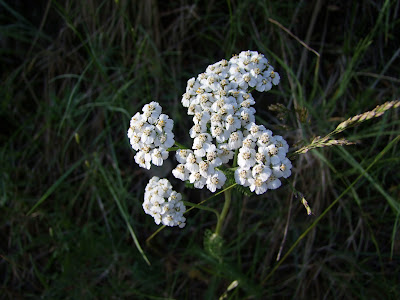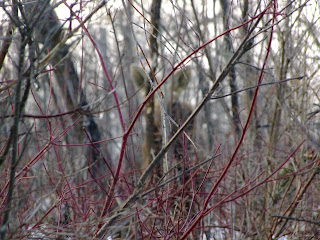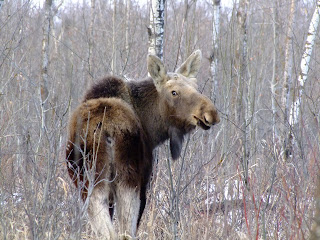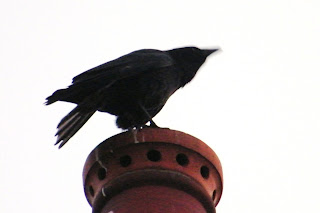aberdeen, early morning haar-fog, may 2012
By this point in my life, I have gone over these events exhaustively, and I can’t seem to figure
out what triggered this period in my life that made me decide to try medication. No one stress seemed so monumental
that it could do this to me, it was everything and nothing. And it was
something that I simply could not seem to muster up the will or strength to do
anything about, and after nearly four months of it, it did not seem like it was
simply a season in my brain, like other intense periods had been. And now I could not do anything, and I wanted
to not exist any more, which also catalysed further anxiety, and that was what
made me decide that psychotropic drugs were probably no worse than what I
currently was feeling. I was in the strange state of not wanting to exist, but not wanting to not want to exist; I felt like I had nothing to lose.
Again, at this stage, I was lucky. Lucky to have such an understanding
psychologist, and a doctor who was patient with me, and warned me that I might
have to try a few different medications to find one that helped. And I did try
a different drug, before I tried the one I still take; it was one that made me quite ill right from the beginning. It made my frenetic thoughts slow down, but to the point where I couldn’t think at all. I went from highly anxious to strangely dulled, depressed. I remember one day when it seemed to only allow me to think about how I could hear the blood in my
veins, and that the raindrops on the windows sounded like they were amplified
and slowed down. I was nauseous constantly, and this was simply not feasible. So we tried something else, and I
was tremendously lucky in that this one just fit. The first week was rough, but all in all, it happened quite quickly. There were side effects, but they were better than how I currently felt, perhaps even a welcome distraction, and so I continued.
Over the next two months, my thoughts slowly returned to
something more normal for me: I could think clearly again, precisely enough to
replace my incessant mantras with more sustainable CBT. I could better tell
when my thoughts were I stopped shaking,
and panic attacks dropped off and I could do things, venture out, do healthy
things. I could distract myself not with sharp things but with productive
things to do with my hands. In essence, it simply allowed me to finally properly do the work I needed to do in order to deal with the anxiety I was feeling, before it got so bad I could no longer even think about doing anything. It allowed me to be clear and functional again, enough to cope.
It was not perfect. It still isn't. Most of the side effects have faded, but some linger at times. I am afraid of running out, losing my pills; I can't forget to take one or I feel it immediately. But this is still many orders of magnitude better than what I was feeling before, and so I deal with it. Through a lot of experimentation I've found the dose and the timing that seems to be optimal for me, and I go with it, while trying as much as I can to do all the non-pharmaceutical things I can to stay healthy.
Because I still get anxious, as I said; I still feel depressed. I have bad periods, very helpless-feeling, unproductive, waves that I have to get through. But these, while trying and unpleasant, are things I feel that I can deal with. They are something different than the pure terror, the neuronal storms of nonsense and inability to think. They arise from things I understand, most of the time, so they feel like something else. And I know that it could be argued that my brain with its faulty substrata
predisposes me to have certain kinds of reactions to things in the world. This
is not unlikely. However, I feel there is such a distinction between feeling
depressed and anxious due to the state of the world and my place in it, the
forces acting against me that I ultimately cannot alter, and feeling anxious
because I am having paranoid, terrifying, irrational thoughts that I still
recognize have no basis in reality. I am not trying to artificially separate the
kinds of anxiety and depression I feel into purely chemical and purely
situational; I am not trying to uphold the harmful Cartesian duality of mind and body that I think is one of the sources of the denigration of mental illness. That the medication seems to help one strain of anxiety though, and not others, though, suggests to my non-neurologist self that perhaps there are different (but connected) kinds; the kind that stems from my brain structure, and the kind that starts from outside of it but I experience and process (of course) through my neuronal set-up. Maybe they are far too entwined to fully separate, and interdependent
in myriad subtle ways; my reactions to the OCD-like thoughts certain do shape my reactions to situation-based anxiety too. I don't fully understand it yet, but I keep trying to. For now, I just want to acknowledge that some of what I feel is
traceable and comprehensible to me, and some of it arose without such triggers;
and the latter is what I find the medication helps.
It didn't magically restore my self-esteem, make me fearless, a better writer, make me love myself unconditionally, flood me with optimism. But it also didn't erase my personality and turn me into a mask-wearing zombie with stunted, inappropriate emotions, nor a shallow, uncritical consumer. It did let me feel more than constant anxiety and panic, though. That was all, and that is what I wanted.
*
I know, though, for some people, these kinds of medication make them feel horrible. They do feel like blank, stumbling automatons, just as clouded and fuzzy as they do while depressed, numbed and dulled. We know that for whatever reason, these medications are temperamental and finicky and quite
unpredictable (just like people’s brains). For some reason, what helps one person’s
anxiety or depression does little to nothing for (or seriously worsens)
another’s condition: I’ve heard both just as many completely terrifying horror stories as accounts of neutrality or ineffectualness as I have successes. And I wish I
knew why this was, wish we were at that point with neurology to have an explanation, but we aren’t. We
still can’t always discern the messenger from the message, the excess from the
essential; why some people’s brain waves look really different from other
people’s even while in very similar states, why this drug I take that they thought would be good for epilepsy (but wasn't) might be good for depression (sometimes, it seems) would end up helping more people with generalized anxiety and obsessive-compulsive disorder (it did for me, anyway).
Perhaps all this speaks to is the incredibly individual
natures of our brains, perhaps more so than any other part of the body. One issue with allopathic medicine is that it
wants to assume that all human bodies are essentially the same, rather than
specific systems, I feel; and perhaps the fact that not all anti-depression and
anti-anxiolytic medications work on every person’s issues I would hazard a guess that my brain
chemicals were perhaps quite responsive to psychotropic medication because I
seem to be pretty sensitive in general to any kind of chemical interference;
sleuthing out the triggers of my migraines has made me realize that the foods I
put in my body have a massive and often immediate effect on how I feel.
Therefore, by fastidiously avoiding those foods and supplementing my diet with
a concoction of vitamins does a lot toward making my migraines less frequent,
because I seem to be pretty chemically suggestible.
I suppose it would be wonderful if I could find a vitamin-potion/food
combination that did the same for my anxiety and depression. I’ve tried a lot
of different combinations, both through my own research and seeing a
naturopath, too, and I continue to try things even though I take pharmaceuticals.
But unlike with my migraines, I wasn’t able to find anything that could stave
off two breaking points. And that was when I decided (both times) to initially
go on my medication, and to continue it after a hiatus. I was doing all the
good things that they tell you to do with mental illness: to eat properly, to
take the vitamins, to exercise. And that helps a great deal, but not enough for
the worst bits, unfortunately.
Now, I did manage to get through a number of difficult
stretches without any medication; the OCD-like periods, some of the self-harm.
Sometimes I wonder if I could have handled my most serious breakdown that way, if
I could have pulled through it too. I realize that many people do go through
very similar things without it. And well – I didn’t. I did what I felt was best
for me at the time, the only thing I felt I could manage. If that makes me
weak, then I suppose I’m weak, but I’m alive, and I can deal with the periods
of depression and anxiety that I still go through because at least I am not contending
with that terror I could not will away on my own. I still struggle with doing a
number of things, but I am far more productive than I ever could have been
without it, I feel. This leaves me with the extra energy I need to deal with
what the drugs do not touch.
Everything that I’ve written may just read like elaborate
and desperate justification for my medication; so be it. For me, it is a potent
reminder for when I start to criticize myself, for when I start to think that I
am wrong to have started the drugs in the first place. I completely understand and respect why someone would never want to touch a psychotropic medication, as I've been there. I just happened to eventually change my mind. And if that makes me just
another brainwashed, ‘addicted’, misguided consumer who will take this
medication for the rest of her life, I suppose that is how it will be. I just
want to be fine with that, to openly acknowledge and explain why I did it, and through I may always struggle with it, I also want to be able to freely acknowledge that I’m grateful that
there was this option available to me. I'll settle for being weak, but functioning; for whatever the anti-psychiatry movement wants to call me, but alive.

















